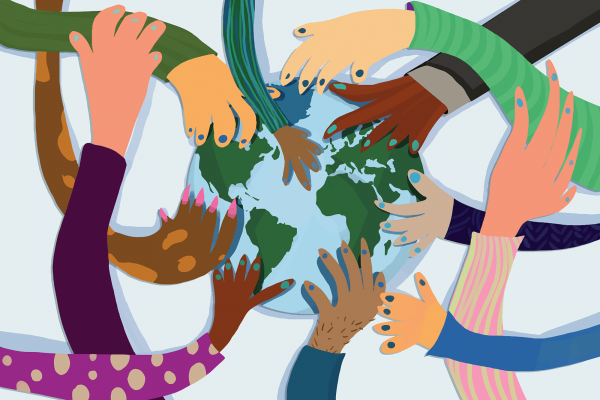ALONG INTERSTATE 10 in southeast Texas, a billboard showcases a wrecked house, presumably from a hurricane, and the words, “The Next Disaster Is Coming. Are You Ready?” I spent a month this summer driving past this sign, enduring a heat dome while visiting family.
A year of intensifying disasters, from wildfires to extreme heat to flooding, has all of us thinking about how to prepare for the next “big one,” whatever that may be in our area. Ready.gov, which this billboard points to, offers practical tips for everything from attacks in public places to tsunamis: Create a plan, gather supplies, map an escape.
While I want to be ready for a disaster, it’s too easy to go from that to catastrophizing, from storing supplies to sitting back under the illusion of self-reliance and control. The billionaires who build luxurious bunkers and the preppers all-consumed with societal collapse show us the extremes of disaster preparedness. It can come with spiritual pitfalls, as the Parable of the Rich Fool illustrates.
In the parable, found in Luke 12:13-21, Jesus warns about relying on lots of stuff for a false sense of security. The rich man stored his surplus grain in huge barns and then sat back to enjoy life, but his life was taken from him that very night. All his efforts couldn’t keep him from harm. Jesus concludes, “This is how it will be with whoever stores up things for themselves but is not rich toward God.”
I’ll probably heed that billboard and put some gallons of water and dry food in the basement. My husband and I also continue to keep a rainy-day fund and save for things such as retirement and kids’ college tuition. But instead of patting myself on the back for our practical and financial preparations, I want to ask these questions: How am I building networks of care, neighborliness, and generosity? Would I be able to knock on my neighbors’ doors to ask for or offer help in a crisis? Can I get to know the local ecosystems better, also building relationships within creation? What spiritual practices can help me and my community be ready, when the time comes, to share our limited stores of food, water, and other resources instead of hoarding them?
Even today, people are fleeing from disasters that I haven’t experienced: Ukrainians, Israelis, and Palestinians from war; Venezuelans from economic crisis; Hondurans from violence and floods. I hold their realities up against my “storehouses” and wonder how to respond in generosity and trust in God’s provision.
How can I release my grip on my own survival? Can I face the possibility of disaster — and even death — with open palms instead of tight fists? All these questions help us discern what it means to be “rich toward God,” as Jesus describes in the parable.
Money and stockpiles can’t provide this kind of disaster preparedness. But as people of faith, it is what we can practice and what we can offer to a world reeling from disasters and longing for a stable center.

Got something to say about what you're reading? We value your feedback!







